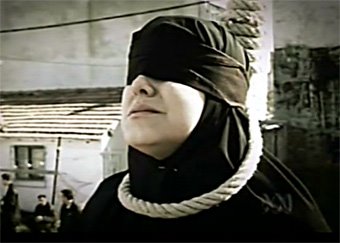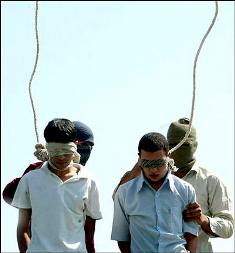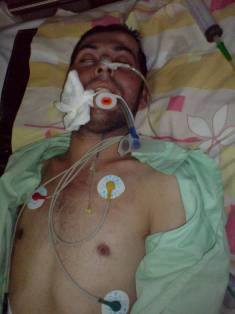URGENT ACTION
iranian kurds at risk of imminent execution
The death sentence s against Loghman Moradi and Zaniar Moradi, two members of Iran’s Kurdish minority have been up held by the Supreme Court . They could now be executed at any time.
Zaniar (or Zanyar) Moradi and Loghman (or Loqman) Moradi were sentenced to public hanging on 22
December 2010 by Branch 15 of the Tehran Revolutionary Court. They have been convicted of “enmity against God” (moharebeh) and “corruption on earth” for allegedly murdering the son of a senior cleric in Marivan, Kordestan province, north-eastern Iran, on 4 July 2009. They have also been convicted of participating in armed activities with Komala, a Kurdish opposition group. The trial reportedly lasted 20 minutes but the two men appealed the sentences. A 12 October 2011report stated that the Supreme Court had upheld the verdicts. According to information, Loghman and Zaniar Moradi have been verbally notified of the Supreme Court’s decision. Amnesty International is investigating reports suggesting that Zaniar Moradi was 17 at the time of his arrest.
Zaniar Moradi and Loghman Moradi were arrested respectively on 1 August 2009 and 17 October 2009 in Marivan. They were held by the Ministry of Intelligence for the first nine months of their detention, when no charges of murder were brought against them. They were moved several times between detention facilities and, at or around the beginning of December 2010, were finally transferred to Section 4 of Raja’i Shahr Prison in Karaj, northwest of Tehran. Loghman and Zaniar Moradi then wrote a letter in which they stated that during their interrogation session by the Ministry of Intelligence they were forced to “confess” to the allegations of murder after being tortured for a period of 25 days and threatened with rape. Both men were denied access to adequate medical treatment.
PLEASE WRITE IMMEDIATELY in Persian, English or your own language :
Urging the Iranian authorities not to carry out the executions of Loghman Moradi and Zaniar Moradi;
Calling on them to commute the death sentences of Loghman Moradi and Zaniar Moradi and anyone else on death row, including other Kurdish political prisoners;
Expressing concern that neither Loghman Moradi nor Zaniar Moradi had a fair trial, and urging the Iranian authorities to investigate the allegations that they were tortured and to bring to justice anyone found responsible for abuses and to disregard as evidence in courts “confessions” which may have been coerced.
P LEASE SEND APPEALS BEFORE 29 NOVEMBER 2011 TO :
Leader of the Islamic Republic
Ayatollah Sayed ‘Ali Khamenei
The Office of the Supreme Leader
Islamic Republic Street – End of Shahid Keshvar Doust Street, Tehran, Islamic Republic of Iran
Email: info_leader@leader.ir
Twitter: "Call on #Iran leader @khamenei_ir to halt the execution of Loghman Moradi and Zaniar Moradi” Salutation: Your Excellency
Head of the Judiciary
Ayatollah Sadegh Larijani
[care of] Public relations Office
Number 4, 2 Azizi Street
Vali Asr Ave., above Pasteur Street intersection
Tehran,
Islamic Republic of Iran Email: bia.judi@yahoo.com (In subject line: FAO Ayatollah Sadegh Larijani)
Salutation: Your Excellency
And copies to:
Secretary General, High Council for Human Rights
Mohammad Javad Larijani
High Council for Human Rights
[Care of] Office of the Head of the Judiciary, Pasteur St., Vali Asr Ave. south of Serah-e Jomhouri, Tehran 1316814737, Islamic Republic of Iran
Email: info@humanrights-iran.ir
(subject line: FAO Mohammad Javad Larijani)
Also send copies to diplomatic representatives accredited to your country.
Please check with your section office if sending appeals after the above date.
URGENT ACTION
iranian kurds at risk of imminent execution
ADditional Information
Loghman Moradi and Zaniar Moradi’s letter from prison also stated that during interrogations by the Ministry of Intelligence, Zaniar Moradi was repeatedly asked about his father, Eghbal Moradi, who lives in Iraq’s Kurdistan province. The letter further describes that Zaniar Moradi was tied to a bed, lashed and subsequently threatened with rape prior to his “confession”.
Kurds, who are one of Iran’s many minorities, live mainly in the west and north-west of the country, in the province of Kordestan and neighbouring provinces bordering Kurdish areas of Turkey and Iraq. They experience discrimination in the enjoyment of their religious, economic and cultural rights (see: Iran: Human rights abuses against the Kurdish minority, (Index: MDE 13/088/2008), 30 July 2008 available at: http://www.amnesty.org/en/library/info/MDE13/088/2008/en). For many years, Kurdish organizations such as the Kurdistan Democratic Party of Iran (KDPI) and the Marxist group Komala conducted armed struggle against the Islamic Republic of Iran, although neither currently does so. The Party For Free Life of Kurdistan (PJAK), was formed in 2004, and carried out armed attacks against Iranian security forces, but declared a unilateral ceasefire in 2009, although it still engages in armed clashes with security forces in what it terms “self-defence”. Since April 2011 there has been an escalation of clashes between Kurdish armed groups and the security forces. From August until the first week of October 2011, the Iranian and Turkish governments shelled border areas where armed Kurdistan Workers' Party (PKK) and PJAK bases were thought to be located. In the first week of September, Iran reportedly rejected a full ceasefire request by PJAK.
Amnesty International condemns without reservation attacks on civilians, which includes judges, clerics, and locally or nationally-elected officials, as attacking civilians violates fundamental principles of international humanitarian law. These principles prohibit absolutely attacks on civilians as well as indiscriminate and disproportionate attacks. Such attacks cannot be justified under any circumstances.
At least 13 other Kurdish men and one Kurdish woman are believed to be on death row in connection with their alleged membership of and activities for proscribed Kurdish organizations. Some have had initial prison sentences increased to death sentences. At least 10 Kurds have reportedly been executed for political offences in recent years.
Since 1990, Iran is believed to have executed at least 51 people convicted of crimes committed when they were under 18 years old. Up to four of these executions were in 2011. For example, 17-year-old Alireza Molla-Soltani was publicly hanged in the city of Karaj, near Tehran on 21 September 2011 (See: Iran executes teenager accused of killing “Iran’s strongest man” , 21 September 2011, http://www.amnesty.org/en/news-and-updates/iran-executes-teenager-accused-killing-%E2%80%9Ciran%E2%80%99s-strongest-man%E2%80%9D-2011-09-21. Amnesty International has compiled a list of more than 144 juvenile offenders on death row in Iran, although it has proved difficult to monitor their subsequent fate in all cases.
The execution of juvenile offenders is prohibited under international law, including Article 6(5) of the International Covenant on Civil and Political Rights (ICCPR) and the Convention on the Rights of the Child (CRC), to which Iran is a state party. In Iran a person convicted of murder has no right to seek pardon or commutation from the state, in violation of Article 6(4) of the ICCPR. The family of a murder victim have the right either to insist on execution, or to pardon the killer and receive financial compensation (diyeh). For more information about executions of juveniles in Iran, please see Iran: The last executioner of children (MDE 13/059/2007), http://web.amnesty.org/library/index/engmde130592007.
Name: Loghman Moradi and Zaniar Moradi
Gender m/f: m
UA: 307/11 Index: MDE 13/094/2011 Issue Date: 19 October 2011



























































